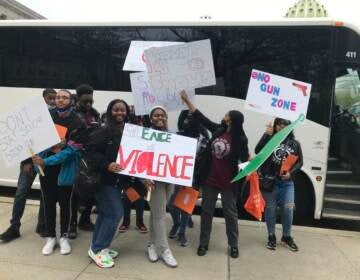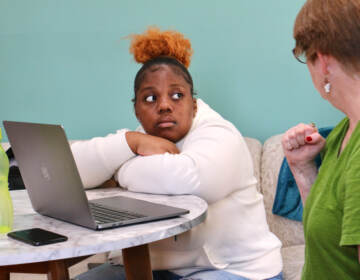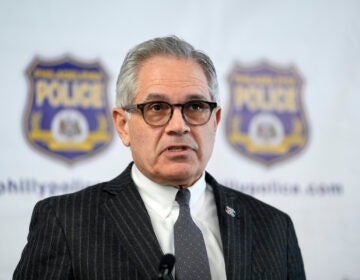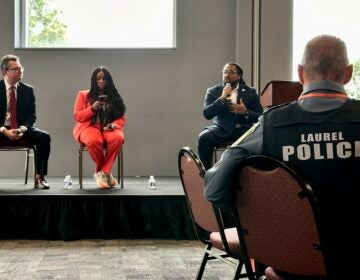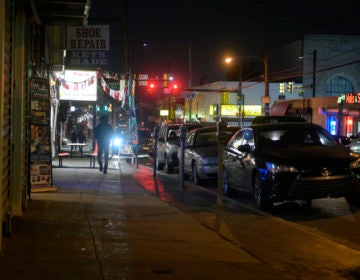‘Love them, lead them’: Advocates say parents play a major role in stopping youth gun violence
Philadelphia nonprofit organizations are now pushing to make trauma education more available to families.
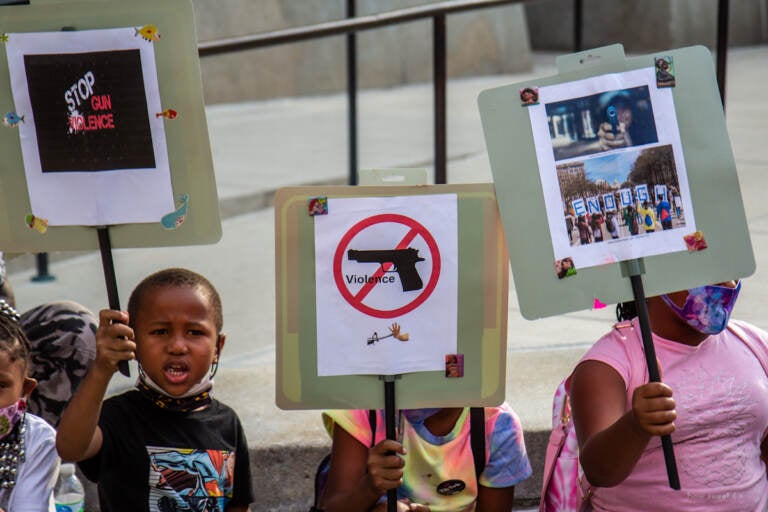
File photo: A group of kids from the Southwest Philadelphia Healthnastics program, ages 3-18, held signs at a protest demanding the Kenney administration do more to address gun violence in the city on Aug. 4, 2021. (Kimberly Paynter/WHYY)
In the aftermath of Texas’s elementary school shooting, and on the two-year mark of George Floyd’s murder by Minneapolis police, the need to help children process the unrelenting toll of gun violence in America is clearer than ever.
Experts and advocates say parents play a crucial role in recognizing and addressing a child’s trauma, whether it stems from watching a mass shooting on the news, witnessing domestic violence at home, hearing a shoot-out on the street, or losing a parent to gunfire.
It’s a lesson that Philadelphians know all too well, and nonprofit organizations are now pushing to make trauma education more available to families.
“It’s happening everywhere and it’s happening on a daily basis,” said Deemika Brown, who lost a son to gun violence in 2020 and is now helping to raise his 4-year-old daughter.
So far this year, 71 children have been shot in Philadelphia, according to the Office of the Controller. They make up 8% of the 839 fatal and nonfatal shootings that occurred in 2022.
Gunfire is a regular part of life for children in North Philly, West Philly and other hard-hit neighborhoods. Philly physicians seeing an influx of bullet-ridden bodies have argued that the impact of urban violence is on par with that of national mass shootings, despite getting less media attention.
“We experience mass shootings in Philadelphia on sort of an every-other-week or certainly every month basis,” said Dr. Jessica Beard, a trauma surgeon at Temple University Hospital and director of research for the Philadelphia Center for Gun Violence Reporting. “I’d like to see the same concern and the same outrage about shootings that happen here every day in Philadelphia, and the same discussion around solutions.”
A growing body of research shows that the way parents interact with their children after exposure to trauma can affect how that child processes the event, and whether that child goes on to engage in violent behavior. The American Academy of Pediatrics published a policy statement last summer emphasizing the significance of “safe, stable, and nurturing relationships as a protective buffer against the biological harms of toxic stress on children — as well as a key toward building resilience.”
Philadelphia activists say parents and caregivers are a missing part of the gun violence puzzle.
“How do we stop the violence, how do we be preventative? It starts at home,” said Deshawnda Williams, clinical director for EMIR Healing Center, an East Falls resource center for families impacted by homicide.
On Tuesday Williams hosted a trauma training for parents and caregivers in partnership with the School District of Philadelphia. It’s part of a broader push to educate adults on a child’s mental state in the wake of violence, and show them how to provide structure, care and tools for regulating emotions and behavior.
Brown attended the workshop in hopes of finding ways to assuage her granddaughter’s grief, confusion and fear.
“[She] witnessed a lot more than we knew,” Brown said. “She’s now just blurting out, ‘my dad left me and I don’t know why’.”
After attending the session, she says she wants to get both the child and her mother connected to counseling.
The workshop covered how trauma affects the brain and can cause certain unexpected behaviors, such as anger, despondence or panic. Williams explained what symptoms of trauma parents should look out for and what steps they can take to mitigate a child having a severe negative reaction.
She said this includes taking steps to limit a child’s exposure to violence — be it in the home, in the streets, on the television or in a video game.
“You love them when you tell them no,” she said. “Just, no. And I think that has to come with a sense of understanding and setting ground rules for them from the beginning.”
But she warns that being too harsh can lead to a bottling-up of emotions.
“They’re not going to conceptualize what you’re trying to convey to them if you do it in such a threatening and invasive way,” she said. “Then you’ve got this angry child going to school, upset, flipping the desk over, throwing chairs, all because of a conversation that took place at home.”
Sharon Smith is currently seeing some of these signs in her 9-year-old grandson, who lost his father to gun violence five years ago.
“It’s just like a rollercoaster with us and his behavior,” she said. “And sometimes I can tell when it’s things that’s related to him thinking about his dad … something major that’s going on. And then he shuts down on me.”
Recently her grandson told her he was scared after hearing about a nearby shooting on the radio.
“I didn’t really think about some of those ‘control’ things that were affecting them,” she said. “I didn’t know.”
She says from now on, she’s going to be careful about what plays in the car when they drive and avoid letting her children stay in the car when she’s doing school pickup.
Both Smith and Brown are part of Moms Bonded by Grief, a support organization for women who’ve lost children to violence.
Executive director Terrez McCleary says she hopes workshops like the ones that took place this week will encourage parents to step up and take a more active role in violence prevention by asking their children about bullying and harassment at school.
“They just need someone to listen to them and to talk with them,” she said. “They have fear in them because they have lost family members to gun violence … they fear they may be the next victim. They feel as though they have to protect themselves before they allow somebody to hurt them.”
She said parents can also keep a closer eye on potentially violent activity.
“Go through your home, flip mattresses, go through closets, open shoeboxes,” she said. “Find out what’s going on in your home.”
There are lots of nonprofit gun violence prevention programs for young people, but Williams said fewer are designed to serve caregivers and children together.
“You can do it à la carte,” she said. “But then there’s times when we come together as a family, as a nucleus.”
Of the more than 50 nonprofit organizations currently receiving financial support from the city to prevent gun violence, only a handful explicitly state that their programs will serve parents or families.
Williams said at EMIR, if she’s working with a child and another counselor is working with that child’s parent, they’ll often consult each other on what’s happening and give compatible exercises as needed.
Multiple gun violence prevention nonprofits across Philadelphia are looking for ways to address the problem with the entire family, instead of just with the young person at risk of involvement. The Day of Serenity in West Philadelphia earlier this month pointed families affected by violence to mental health resources, and the NOMO Foundation is launching a weekly trauma healing event for families beginning this Saturday.
Williams says parents and caregivers should be prepared to step up their involvement this summer to protect children from potential harm. She suggests leaning on the acronym H.E.L.P. to remember to “hold and honor” children, “empower and encourage” them, “love them, lead them and laugh with them” and “pray” with them. This can mean asking questions in non-judgmental ways that open up a space to talk, providing words of affirmation, or just planning low-stress activities where families can laugh together.
She says with her clients at EMIR, she often tells them to do something fun and different with their kids. If they say they can’t afford it, she helps them look around online for free activities.
“And if you are savvy enough, you figure out when you get some free water ice and the free pretzels and the free this and the free that,” she said. “You can really make a whole schedule. I’ve done that for my clients.”
The trauma workshops were part of a series of parent-centered virtual events hosted by the School District of Philadelphia related to stress, financial literacy, and other topics.
The city has announced a partnership with the Philadelphia Housing Authority to prevent violence by providing mental health help, skill-building, and job-finding assistance to families in public housing who are most at-risk.
Philadelphia resources
- “Where’s My Daddy?” is a children’s book about dealing with the loss of a parent, written by a Philadelphia mother who lost a son to gun violence
- EMIR Healing Center provides counseling and other services for families affected by homicide
- Moms Bonded by Grief is a support group for mothers who’ve lost someone to gun violence
- The NOMO Foundation is offering trauma-focused Saturday sessions for families beginning this weekend, for more details email info@nomofoundation.org
- Uplift Center for Grieving Children, in partnership with the School District of Philadelphia, offers grief groups and a Hope Line: 1-833-745-4673
- Find more local resources at Up the Block
___
If you or someone you know has been affected by gun violence in Philadelphia, you can find grief support and resources here.
WHYY is your source for fact-based, in-depth journalism and information. As a nonprofit organization, we rely on financial support from readers like you. Please give today.


